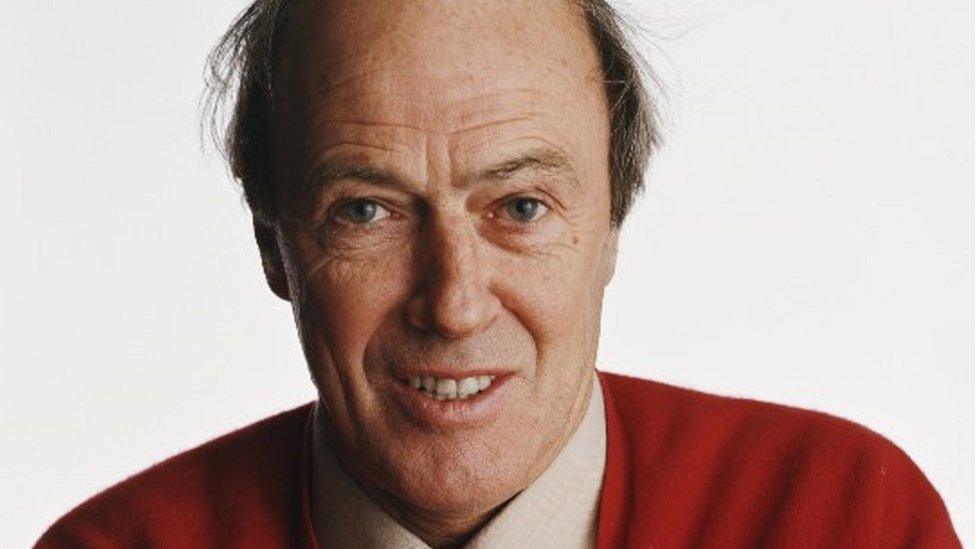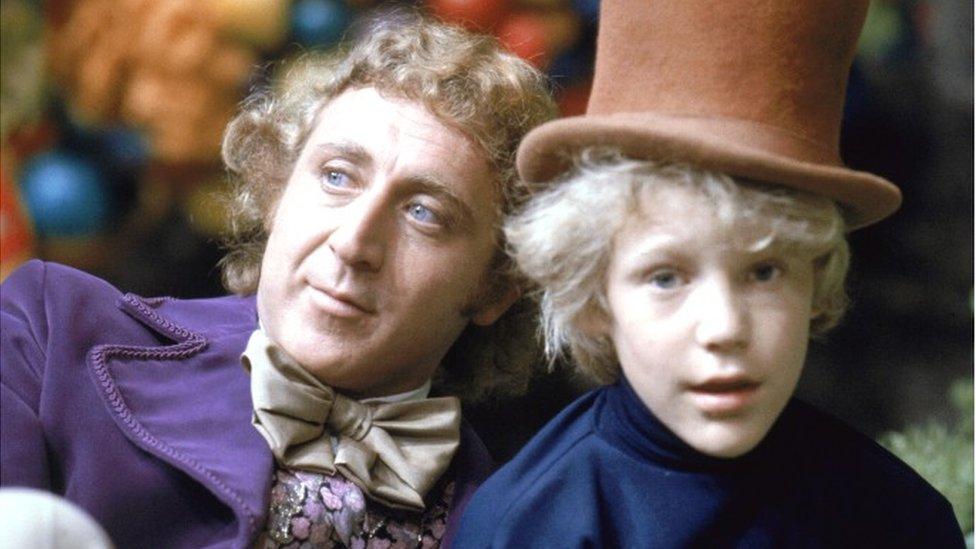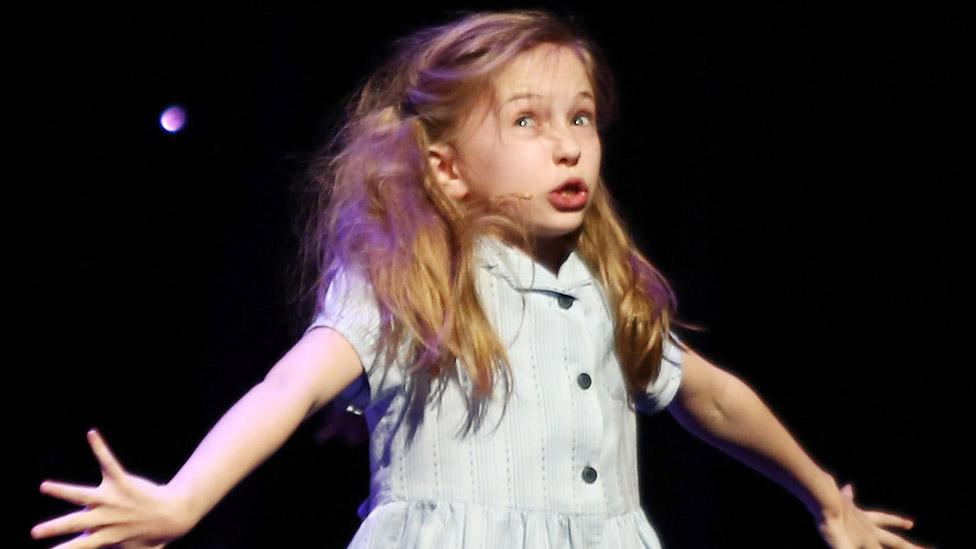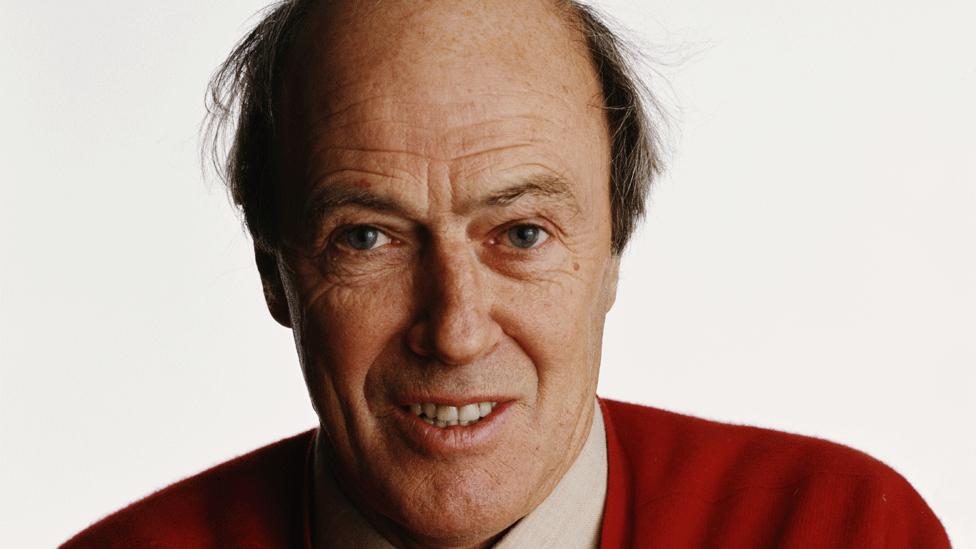Roald Dahl: Rishi Sunak joins criticism of changes to author's books
- Published

Prime Minister Rishi Sunak has criticised changes to Roald Dahl books, after the removal of some references to things like characters' appearance and weight sparked a fierce debate.
Dahl's estate and publisher said works including The BFG and Charlie and the Chocolate Factory had been updated to be more suitable for modern audiences.
Some said they approved of the changes.
But Mr Sunak's spokesman said works of fiction should be "preserved and not airbrushed".
Borrowing a word Dahl invented for playing with language, the PM's spokesman said: "When it comes to our rich and varied literary heritage, the prime minister agrees with the BFG that we shouldn't gobblefunk around with words."
Others to speak out against the changes include author Sir Salman Rushdie.
"Roald Dahl was no angel but this is absurd censorship," the Midnight's Children and Satanic Verses writer posted on Twitter., external "Puffin Books and the Dahl estate should be ashamed."
The Roald Dahl Story Company has said any edits to have come from its review process, which has been ongoing since 2020, were "small and carefully considered".
His Dark Materials author Philip Pullman told BBC Radio 4 that Dahl's books "should be allowed to fade away" rather than be changed if they are deemed offensive.
"If Dahl offends us, let him go out of print," said Pullman. "Read all these [other] wonderful authors who are writing today, who don't get as much of a look-in because of the massive commercial gravity of people like Roald Dahl."
But poet and author Debjani Chatterjee believes it is "a very good thing that the publishers are reviewing his work".
She told the BBC World Service: "I think it's been done quite sensitively. Take the word 'fat'. They've used 'enormous'. If anything, I actually think 'enormous' is even funnier."
What has changed?
Augustus Gloop, from Charlie and the Chocolate Factory, is now described as "enormous", with the word "fat" removed from every book, according to the Telegraph, external
Mrs Twit, from the Twits, is no longer "ugly and beastly", but simply "beastly"
In the same book, "a weird African language" is no longer weird
The words "crazy" and "mad" have also been removed as a result of an emphasis on mental health, the newspaper reported
A threat to "knock her flat" in Matilda has become "give her a right talking to"
References to colours have also been changed - the BFG's coat is no longer black; while Mary in The BFG now goes "still as a statue" instead of "white as a sheet"
'A tribute' or 'removing the spirit'?
Children's author John Dougherty told BBC Radio 5 Live: "There's no reason the BFG shouldn't have a black cloak. That just seems absurd.
"And Augustus Gloop, for instance - the whole point of the character is that he's hugely overweight because he won't stop eating - he's greedy.
"Now, there might be an argument that that's offensive in today's world," Dougherty continued. "I think if you're going to decide that, then the only answer is to put the book out of print. I don't think you can say, 'So let's change Dahl's words but keep the character'."
Kate Clanchy, an ex-teacher who revised her own memoir after being criticised for some descriptions, said children's books should be treated particularly carefully.
"Augustus Gloop is a greedy character. He'll still remain morally greedy and his moral greed will be wrong, whether or not we have lots of lots and lots of references to how fat he is, which I think can be upsetting," she told 5 Live.
"We've always updated children's books. It's a tribute to the way that these books are becoming myths... that we've adjusted them again."
Laura Hackett, deputy literary editor of the Sunday Times, said she would continue to read her original copies of Dahl's books to her children in all "their full, nasty, colourful glory".
"I think the sort of the nastiness is what makes Dahl so much fun," she told 5 Live. "You love it when, in Matilda, Bruce Bogtrotter is forced to eat that whole chocolate cake, or you are locked up in the Chokey [a torture device] - that's what children love.
"And to remove all references to violence or anything that's not clean and nice and friendly, then you remove the spirit of those stories."
'Enjoyed by all children today'

Many of Roald Dahl's books have also been made into movies
The books have been amended after being reviewed by sensitivity readers, who check for potentially offensive content.
The Roald Dahl Story Company worked with publishers Puffin and Inclusive Minds, a collective working towards inclusion and accessibility in children's literature.
A spokesperson for the Roald Dahl Story Company said it wanted "to ensure that Roald Dahl's wonderful stories and characters continue to be enjoyed by all children today".
"When publishing new print runs of books written years ago, it's not unusual to review the language used alongside updating other details including a book's cover and page layout," it said.
It added: "Our guiding principle throughout has been to maintain the storylines, characters, and the irreverence and sharp-edged spirit of the original text."
Dahl, who died aged 74 in 1990, remains one of the UK's most popular children's authors, and Netflix bought the rights to his works in 2021.
But antisemitic comments made throughout his life led to Dahl being a highly problematic figure.
In 2020, his family apologised, saying they recognised the "lasting and understandable hurt caused by Roald Dahl's antisemitic statements".
Related topics
- Published22 September 2021

- Published6 December 2020
